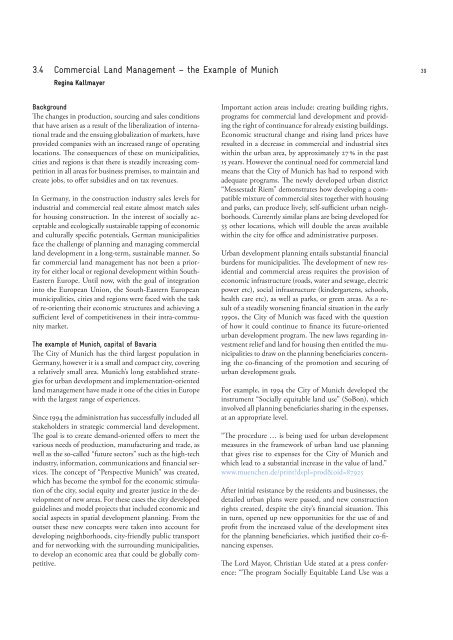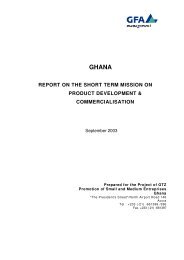Local/Regional Economic Development in South ... - Value Chains
Local/Regional Economic Development in South ... - Value Chains
Local/Regional Economic Development in South ... - Value Chains
You also want an ePaper? Increase the reach of your titles
YUMPU automatically turns print PDFs into web optimized ePapers that Google loves.
3. Commercial Land Management – the Example of Munich<br />
Reg<strong>in</strong>a Kallmayer<br />
Background<br />
The changes <strong>in</strong> production, sourc<strong>in</strong>g and sales conditions<br />
that have arisen as a result of the liberalization of <strong>in</strong>ternational<br />
trade and the ensu<strong>in</strong>g globalization of markets, have<br />
provided companies with an <strong>in</strong>creased range of operat<strong>in</strong>g<br />
locations. The consequences of these on municipalities,<br />
cities and regions is that there is steadily <strong>in</strong>creas<strong>in</strong>g competition<br />
<strong>in</strong> all areas for bus<strong>in</strong>ess premises, to ma<strong>in</strong>ta<strong>in</strong> and<br />
create jobs, to offer subsidies and on tax revenues.<br />
In Germany, <strong>in</strong> the construction <strong>in</strong>dustry sales levels for<br />
<strong>in</strong>dustrial and commercial real estate almost match sales<br />
for hous<strong>in</strong>g construction. In the <strong>in</strong>terest of socially acceptable<br />
and ecologically susta<strong>in</strong>able tapp<strong>in</strong>g of economic<br />
and culturally specific potentials, German municipalities<br />
face the challenge of plann<strong>in</strong>g and manag<strong>in</strong>g commercial<br />
land development <strong>in</strong> a long-term, susta<strong>in</strong>able manner. So<br />
far commercial land management has not been a priority<br />
for either local or regional development with<strong>in</strong> <strong>South</strong>-<br />
Eastern Europe. Until now, with the goal of <strong>in</strong>tegration<br />
<strong>in</strong>to the European Union, the <strong>South</strong>-Eastern European<br />
municipalities, cities and regions were faced with the task<br />
of re-orient<strong>in</strong>g their economic structures and achiev<strong>in</strong>g a<br />
sufficient level of competitiveness <strong>in</strong> their <strong>in</strong>tra-community<br />
market.<br />
The example of Munich, capital of Bavaria<br />
The City of Munich has the third largest population <strong>in</strong><br />
Germany, however it is a small and compact city, cover<strong>in</strong>g<br />
a relatively small area. Munich’s long established strategies<br />
for urban development and implementation-oriented<br />
land management have made it one of the cities <strong>in</strong> Europe<br />
with the largest range of experiences.<br />
S<strong>in</strong>ce 1994 the adm<strong>in</strong>istration has successfully <strong>in</strong>cluded all<br />
stakeholders <strong>in</strong> strategic commercial land development.<br />
The goal is to create demand-oriented offers to meet the<br />
various needs of production, manufactur<strong>in</strong>g and trade, as<br />
well as the so-called “future sectors” such as the high-tech<br />
<strong>in</strong>dustry, <strong>in</strong>formation, communications and f<strong>in</strong>ancial services.<br />
The concept of “Perspective Munich” was created,<br />
which has become the symbol for the economic stimulation<br />
of the city, social equity and greater justice <strong>in</strong> the development<br />
of new areas. For these cases the city developed<br />
guidel<strong>in</strong>es and model projects that <strong>in</strong>cluded economic and<br />
social aspects <strong>in</strong> spatial development plann<strong>in</strong>g. From the<br />
outset these new concepts were taken <strong>in</strong>to account for<br />
develop<strong>in</strong>g neighborhoods, city-friendly public transport<br />
and for network<strong>in</strong>g with the surround<strong>in</strong>g municipalities,<br />
to develop an economic area that could be globally competitive.<br />
Important action areas <strong>in</strong>clude: creat<strong>in</strong>g build<strong>in</strong>g rights,<br />
programs for commercial land development and provid<strong>in</strong>g<br />
the right of cont<strong>in</strong>uance for already exist<strong>in</strong>g build<strong>in</strong>gs.<br />
<strong>Economic</strong> structural change and ris<strong>in</strong>g land prices have<br />
resulted <strong>in</strong> a decrease <strong>in</strong> commercial and <strong>in</strong>dustrial sites<br />
with<strong>in</strong> the urban area, by approximately 27 % <strong>in</strong> the past<br />
15 years. However the cont<strong>in</strong>ual need for commercial land<br />
means that the City of Munich has had to respond with<br />
adequate programs. The newly developed urban district<br />
“Messestadt Riem” demonstrates how develop<strong>in</strong>g a compatible<br />
mixture of commercial sites together with hous<strong>in</strong>g<br />
and parks, can produce lively, self-sufficient urban neighborhoods.<br />
Currently similar plans are be<strong>in</strong>g developed for<br />
33 other locations, which will double the areas available<br />
with<strong>in</strong> the city for office and adm<strong>in</strong>istrative purposes.<br />
Urban development plann<strong>in</strong>g entails substantial f<strong>in</strong>ancial<br />
burdens for municipalities. The development of new residential<br />
and commercial areas requires the provision of<br />
economic <strong>in</strong>frastructure (roads, water and sewage, electric<br />
power etc), social <strong>in</strong>frastructure (k<strong>in</strong>dergartens, schools,<br />
health care etc), as well as parks, or green areas. As a result<br />
of a steadily worsen<strong>in</strong>g f<strong>in</strong>ancial situation <strong>in</strong> the early<br />
1990s, the City of Munich was faced with the question<br />
of how it could cont<strong>in</strong>ue to f<strong>in</strong>ance its future-oriented<br />
urban development program. The new laws regard<strong>in</strong>g <strong>in</strong>vestment<br />
relief and land for hous<strong>in</strong>g then entitled the municipalities<br />
to draw on the plann<strong>in</strong>g beneficiaries concern<strong>in</strong>g<br />
the co-f<strong>in</strong>anc<strong>in</strong>g of the promotion and secur<strong>in</strong>g of<br />
urban development goals.<br />
For example, <strong>in</strong> 1994 the City of Munich developed the<br />
<strong>in</strong>strument “Socially equitable land use” (SoBon), which<br />
<strong>in</strong>volved all plann<strong>in</strong>g beneficiaries shar<strong>in</strong>g <strong>in</strong> the expenses,<br />
at an appropriate level.<br />
“The procedure … is be<strong>in</strong>g used for urban development<br />
measures <strong>in</strong> the framework of urban land use plann<strong>in</strong>g<br />
that gives rise to expenses for the City of Munich and<br />
which lead to a substantial <strong>in</strong>crease <strong>in</strong> the value of land.”<br />
www.muenchen.de/pr<strong>in</strong>t?depl=prod&oid=87925<br />
After <strong>in</strong>itial resistance by the residents and bus<strong>in</strong>esses, the<br />
detailed urban plans were passed, and new construction<br />
rights created, despite the city’s f<strong>in</strong>ancial situation. This<br />
<strong>in</strong> turn, opened up new opportunities for the use of and<br />
profit from the <strong>in</strong>creased value of the development sites<br />
for the plann<strong>in</strong>g beneficiaries, which justified their co-f<strong>in</strong>anc<strong>in</strong>g<br />
expenses.<br />
The Lord Mayor, Christian Ude stated at a press conference:<br />
“The program Socially Equitable Land Use was a<br />
39



